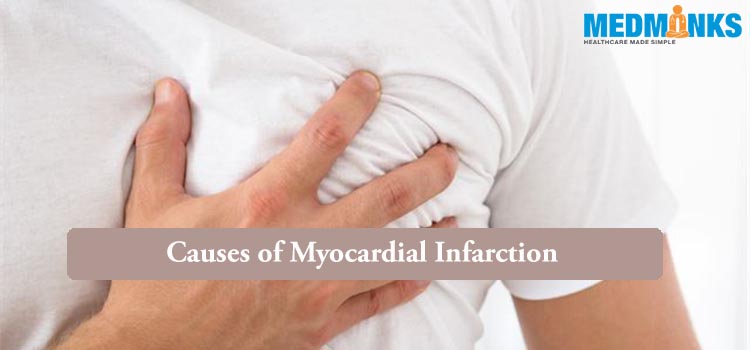Myocardial Infarction Treatment

What is Myocardial Infarction?
Myocardial Infarction aka heart attack is a form of medical emergency that occurs when a blood clot blocks the passageway of the blood to flow into the heart, without the blood, the tissue is unable to receive oxygen which leads them to die. Depending on the severity of the case heart attacks can be treated through medical procedures or might require a surgical procedure. It is prevalent in people above the age of 41 years of age. Myocardial Infarction Treatments are very beneficial in restoring the original condition of the heart. However, they demand the patient to make a lot of lifestyle changes.
Also Read: Warning Signals of Heart Problems
Causes of Myocardial Infarction
Bad Cholesterol – or LDL (Low-Density Lipoprotein) is a leading cause of arterial blockage. Bad cholesterol is a colourless substance found in all types of food that we consume every day that leads to plaque build-up on the walls of the arteries that narrow the space tampering the blood flow.
Saturated Fats – lead to plaque build-up or arterial blockage in coronary arteries by increasing bad cholesterol in the blood, while reducing the good cholesterol.
Trans Fat – is the primary cause of clogged arteries, which increases the amount of bad fat in the body swelling the and creating clots in the arteries.
Conditions at that lead to high risk of Acute Myocardial Infarction:
- High Blood Pressure
- High Triglyceride Levels
- High Cholesterol Levels
- Diabetes and High Sugar Levels
- Obesity
- Smoking
- Family History
Symptoms of Myocardial Infarction
- People might experience the following things before or during a heart attack:
- Pain Areas – Shoulder blades, jaw, left arm, chest, or upper abdomen
- Pain Type – can feel like a Pinching or clenching fist against the chest
- Gastrointestinal – Indigestion, Nausea, Heartburn
- Other Common Feelings – Anxiety, chest pressure, shoulder discomfort, shortness in breath, palpitations, a sensation of tightness around the neck or the arms.
Myocardial Infarction Treatment
Oral Medications – Heart care medicines, Narcotics, Blood thinners, Statin, Beta blocker, and ACE inhibitor.
Required Supportive Care
• Oxygen Therapy – for providing extra push of oxygen into the lungs of the patient suffering from breathing problems.
• Defibrillation therapy – use of electrical shocks for correcting irregular heartbeats.
Surgery – Coronary Artery Bypass Surgery
Coronary Artery Bypass is a surgical procedure in which the blood flow in the patient's heart is restored by replacing a healthy vein or artery with the blocked artery.
Other Medical Procedures
Coronary Stent
During the procedure, the chest is opened a coronary stent (a tube placed in the heart arteries) to ensure that to keep the arteries open so that the blood can flow smoothly.
Coronary Angioplasty
In Coronary Angioplasty, a thin flexible tube is inserted in the blood vessels which are inflated using the balloon present inside them, that them in opening the narrowed or the blocked blood arteries. A stent can also be used in this procedure for preventing the arteries from closing.
Specialists involved during the surgery
Cardiac Surgeon, Cardiologist, PCP (Primary Care Provider), Emergency Medicine Doctor.
Myocardial Infarction Treatment Cost
The cost of Myocardial infraction depends on the type of treatment that is being used by the patient to handle his/her heart attack. Myocardial Infraction can cost starts from USD 400 for its initial treatment. In some critical cases, the patient might require a heart transplant which might cost starts from USD 700,00.
FAQs
How to stay fit after a heart attack or a Myocardial Infraction surgery?
Start the Cardiac Rehabilitation Therapy
A lifestyle transforming supervised programme that includes a balanced diet, exercise, awareness and emotional support for people suffering from heart diseases.
Is myocardial infraction treatable?
Myocardial infarction is a treatable condition that can be cured through surgical and nonsurgical treatment. In some cases, myocardial infractions can be easily treated with regular consumption of blood thinners, whereas some acute cases might require cardiac surgery.
Explore Medmonks.com to find the best hospitals for Myocardial Infarction Treatment in India.





